Summary by Rex Rumsey and Sanjay Sukumar, Kelley MBA Class of ’24
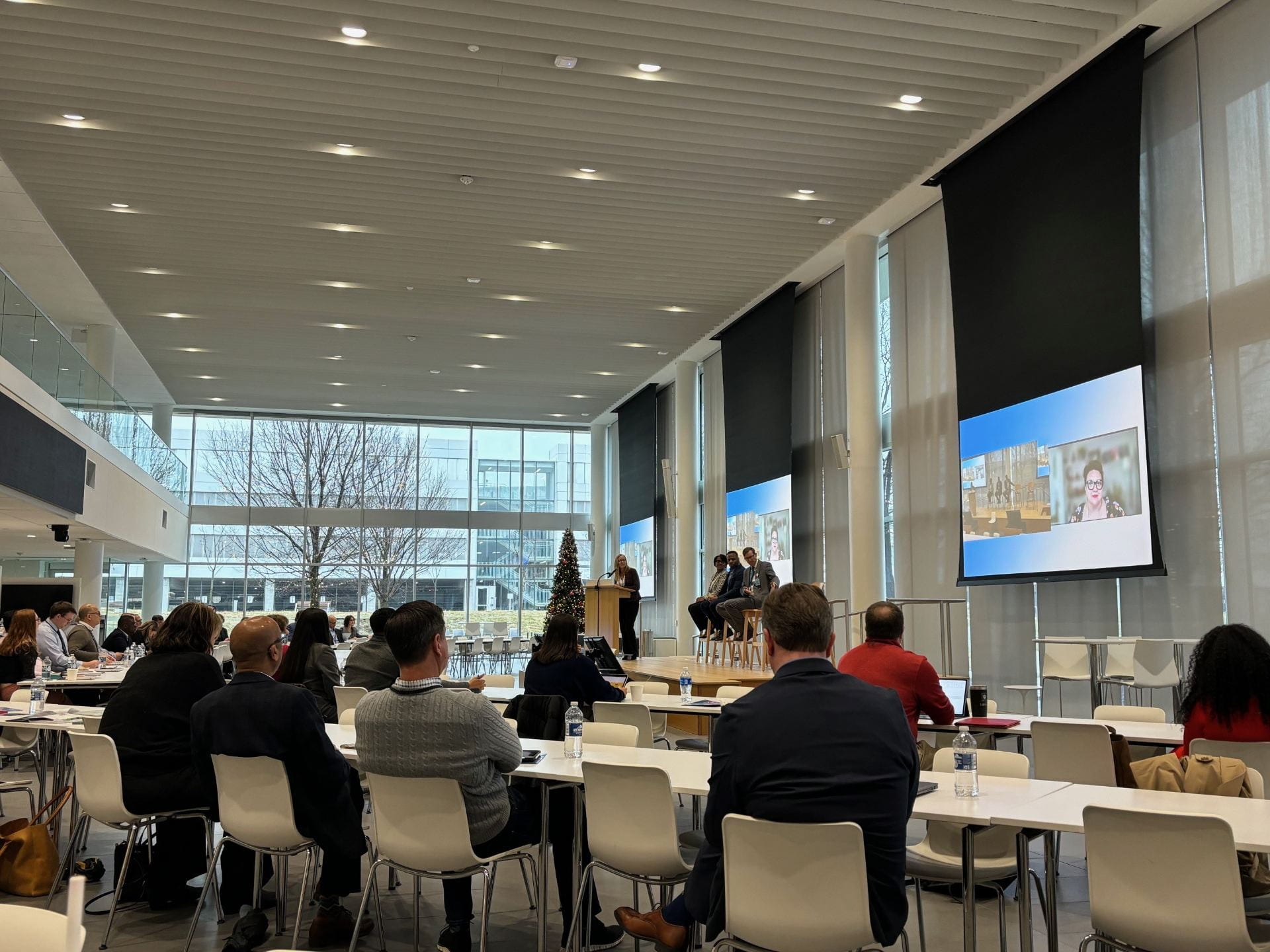
Morning panel discuss provider perspectives and initiatives
On December 1, 2023, the Center for Life Sciences at IU Kelley School of Business hosted a business conference focused on closing the gap in health inequalities. The event, part of an ongoing series, was held at the Roche facility. Key sponsors included CAI, Elevance Health, Lab Corp, Eli Lilly, and Reckitt. Primary sponsors Boston Scientific, Cook Medical, Indiana CTSI, Deloitte, and Roche, alongside supporting sponsors BioCrossroads, Blueprint Marketing Group, and Miles. The conference began with a welcome address by Brian Moore, Medical Affairs Executive Director at Genentech, who emphasized the importance of achieving equality in healthcare. The opening keynote by Professor Paul K. Halverson, the founding Dean of IU Richard M Fairbanks School of Public Health, set the stage for the day. The session defined the health inequalities and associated challenges in life sciences, sparking insightful discussions. Two panel discussions and a luncheon keynote followed.
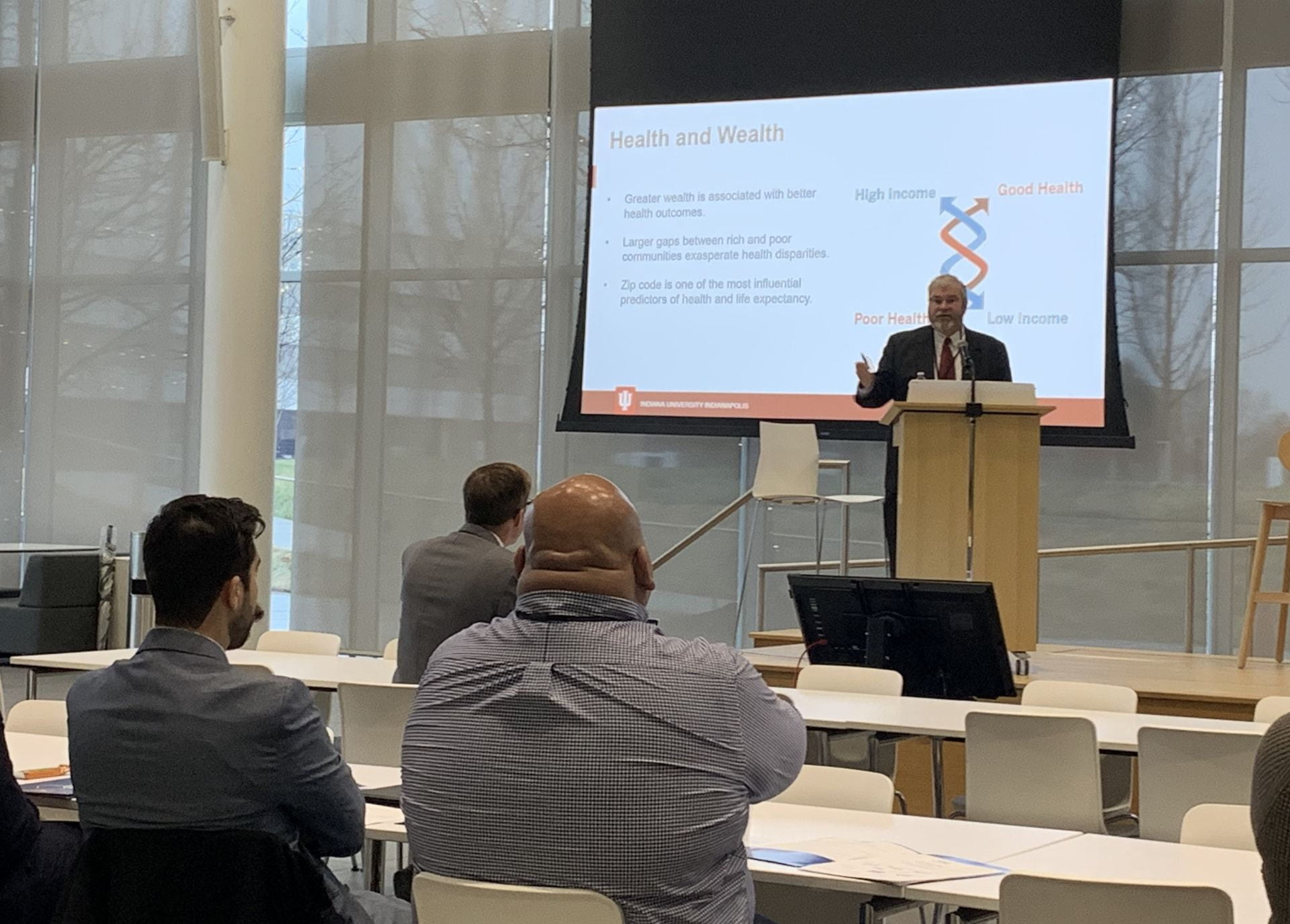
Dr. Paul K. Halverson presenting the morning keynote.
Opening Keynote – Defining Health Inequalities by Paul K. Halverson
Paul K. Halverson, Professor & Founding Dean, Richard M. Fairbanks School of Public Health, Indiana University
The opening keynote by Mr. Halverson set a comprehensive foundation for the subsequent discussions, particularly by defining the concept of inequality in the context of healthcare delivery. He initiated with a fundamental question—why does public health matter—and touched upon critical themes, including the influence of wealth on accessing care and the surprising role of one’s residential zipcode as a predictor of health and life expectancy. Mr. Halverson spotlighted a noteworthy issue—the United States is lagging behind other OECD countries despite spending more on healthcare. He attributed 75% of healthcare spending in the US to preventable conditions, while less than 5% is allocated for prevention and public health initiatives. His emphasis on allocating more budget towards proactive measures rather than reactive spending on illness was a key takeaway.
Introducing a clear definition of public health at the outset provided a solid framework for the proceedings. Mr. Halverson proceeded to outline the existing public health systems and highlighted ten significant recent public health achievements. Notably, he delved into Indiana’s and the US’s positions in health rankings, identifying areas for improvement. He concluded the session by elucidating Governor Holcomb’s Public Health Commission, its responsibilities, and the key performance indicators (KPIs) that counties must adhere to for participation in the initiative.
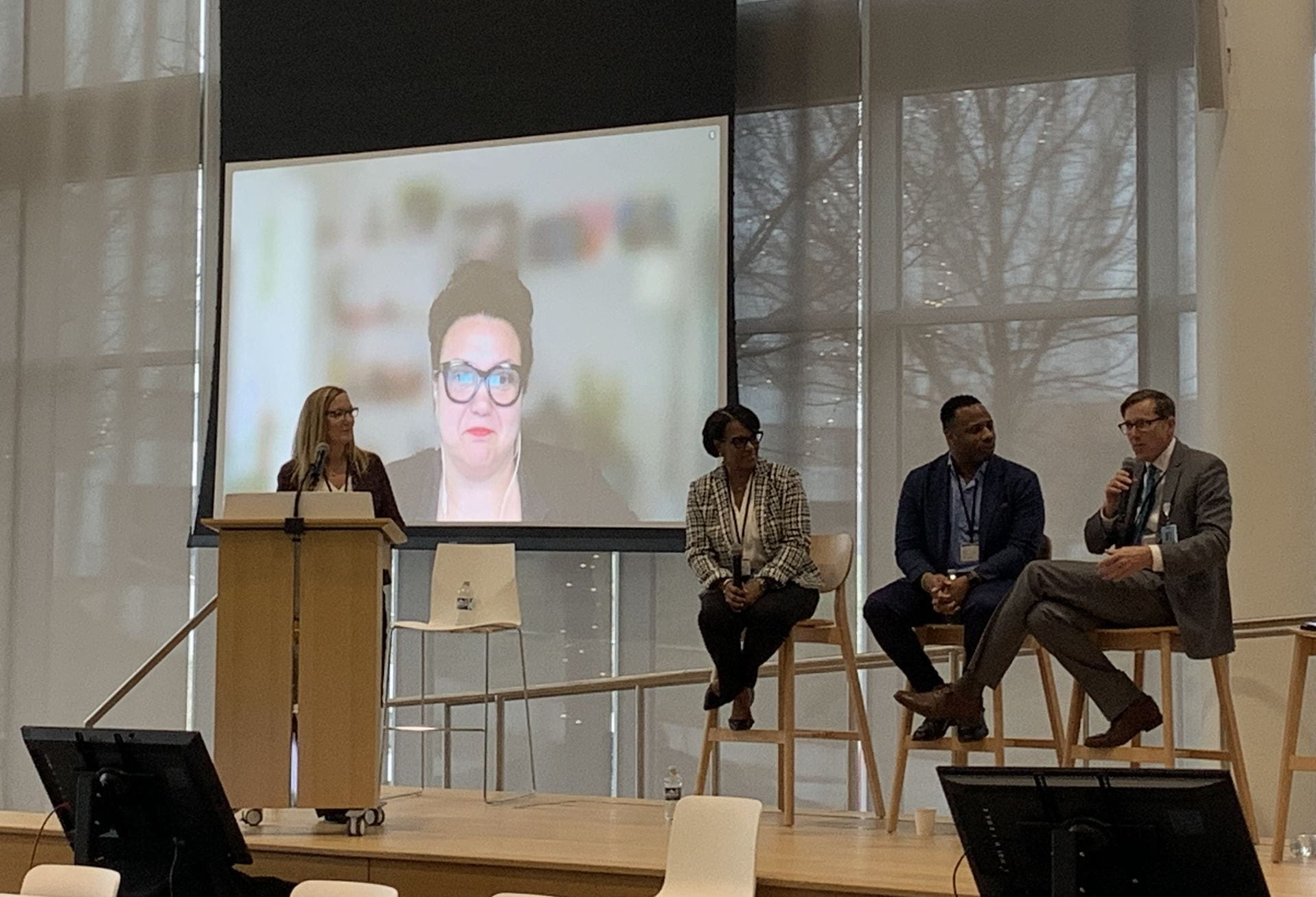
Morning panel discuss provider perspectives and initiatives.
Panel – Provider Perspective and Initiatives
Moderator: Marsha Weiner, Director Project Management Office, Boston Scientific
Panelists:
-Brownsyne Tucker Edomonds, MD, Associate Professor of Obstetrics & Gynecology;Associate Dean for Health Equity Research, IU School of Medicine; Chief Health Equity Officer, IU Health
-Edmond Davis, Senior Director, Health Equity, Zimmer Biomet
-Tedd Grain, Vice President & Director of Social Determinants of Health, Eskanazi Health Foundation & Eskanazi Health View Grain Presentation
-Claudia Marquez, PhD, Scientific Liaison, Molecular Lab & Infectious Disease, Roche Diagnostics
Following the impactful keynote, a panel discussion unfolded, focusing on provider perspectives and initiatives. Marsha Weiner, Director PMO at Boston Scientific, skillfully moderated the session. The panel comprised Brownsyne Tucker Edmonds, M.D, Associate Professor of Obstetrics & Gynecology, and Associate Dean for Health Equity Research at IU School of Medicine, as well as VP and Chief Health Equity Officer at IU Health. Edmond Davis, Senior Director, Health Equity at Zimmer Biomet, Tedd Grain, VP and Director of Social Determinants of Health at Eskenazi Health Foundation & Eskenazi Health, and Claudia Marquez, PhD, Scientific Liaison, Molecular Lab and Infection Disease, Roche Diagnostics.
Dr. Edmonds passionately defined health equity as providing a fair chance for optimal well-being. She stressed the need to eliminate barriers like poverty and discrimination, addressing their profound impacts on access to resources. IU Health’s commitment to this cause was highlighted through the “STEEEP” framework, emphasizing Equity as the third ‘E.’ This guide outlines collaborative efforts among partners dedicated to achieving health equity. Edmonds outlined three pillars supporting IU Health’s commitment: equitable access, experience, and outcomes of care. Additionally, she introduced the Health Equity Quality Improvement (HEQI) initiative, incorporated into the Promise Dashboard in 2023. Components like CHECK-IT, iHEART, and Real Data were detailed, emphasizing IU Health’s dedication to ongoing improvement in health equity through measurable and impactful initiatives.
Edmond Davis, the second panelist, highlighted Zimmer Biomet’s progressive C3 (Community Centered Care) initiative, placing patients at the core of the company’s operations. He expressed active efforts to operationalize equitable services, aligning with the company’s mission. The C3 initiative aims to improve access to quality care in underserved communities, leveraging orthopedic innovation for better patient outcomes. Davis shared insights into addressing social determinants of health, focusing on non-medical factors like stress, socio-economic issues, and education. The presentation revealed that these social determinants can impact up to 80% of health outcomes. Davis presented metrics highlighting the influence of social factors on individual care levels, stressing the importance of a holistic healthcare approach. Concluding his presentation, Davis detailed Zimmer Biomet’s 5-pronged approach to implementing the C3 initiative’s vision.
The final panelist, Tedd Grain, detailed Eskenazi Health’s robust initiatives to ensure health equity. He explained Eskenazi Health’s Social Determinants of Health (SDOH) objectives and showcased a map illustrating the Indianapolis Social Vulnerability Index. Eskenazi Health is transitioning from patient-level care to community-level interventions, establishing a Health Equity Zone. This initiative aims to foster a healthy neighborhood through a shared vision and joint implementation of health goals. Grain elaborated on the expansion of services, including Community Weavers, Community Health Workers, and the Fresh for You Market at the Basile Pavilion, along with the innovative Fresh for You Market on Wheels.

Luncheon Keynote – Snapshots of Ongoing Initiatives
Moderator: Todd Blake, Managing Director, Healthcare Information Technology, Deloitte Consulting LLP
Panelists:
-Paige Bingham, Director, Close the Gap, Boston Scientific View Bingham Presentation
-Beth Evans, Senior Vice President, Corporate Affairs, Aging and In-Home Services of NE IN View Evans Presentation
-Gregory Garrett, Deputy Director, United Northeast Development Corporation
-Ariana McGee, Founder & CEO, Navigate Maternity View McGee Presentation
-Holly Wood, Senior Director, Health Equity Initiative, Purdue University View Wood Presentation
The luncheon keynote, moderated by Todd Blake, MD, Healthcare Information Technology at Deloitte Consulting, featured a distinguished panel. Panel members included Paige Bingham, Director of Close the Gap; Ariana McGee, Founder and CEO of Navigate Maternity; Holly Wood, Senior Director of Health Equity Initiative at Purdue University; and Beth Evans, representing Ground Game.
Ms. Bingham conveyed Close the Gap team’s vision of eradicating inequities in life-and-limb-saving care, particularly focusing on women and people of color. She presented compelling metrics revealing barriers to care that result in heart and vascular treatment disparities for these groups. Ms. Bingham outlined the team’s strategic shift from mere action to tangible impact by identifying care disparities, championing change, and transparently sharing outcomes. The team is actively developing an action plan centered on building community trust and instigating systemic change, emphasizing a commitment to transforming the landscape of healthcare disparities.
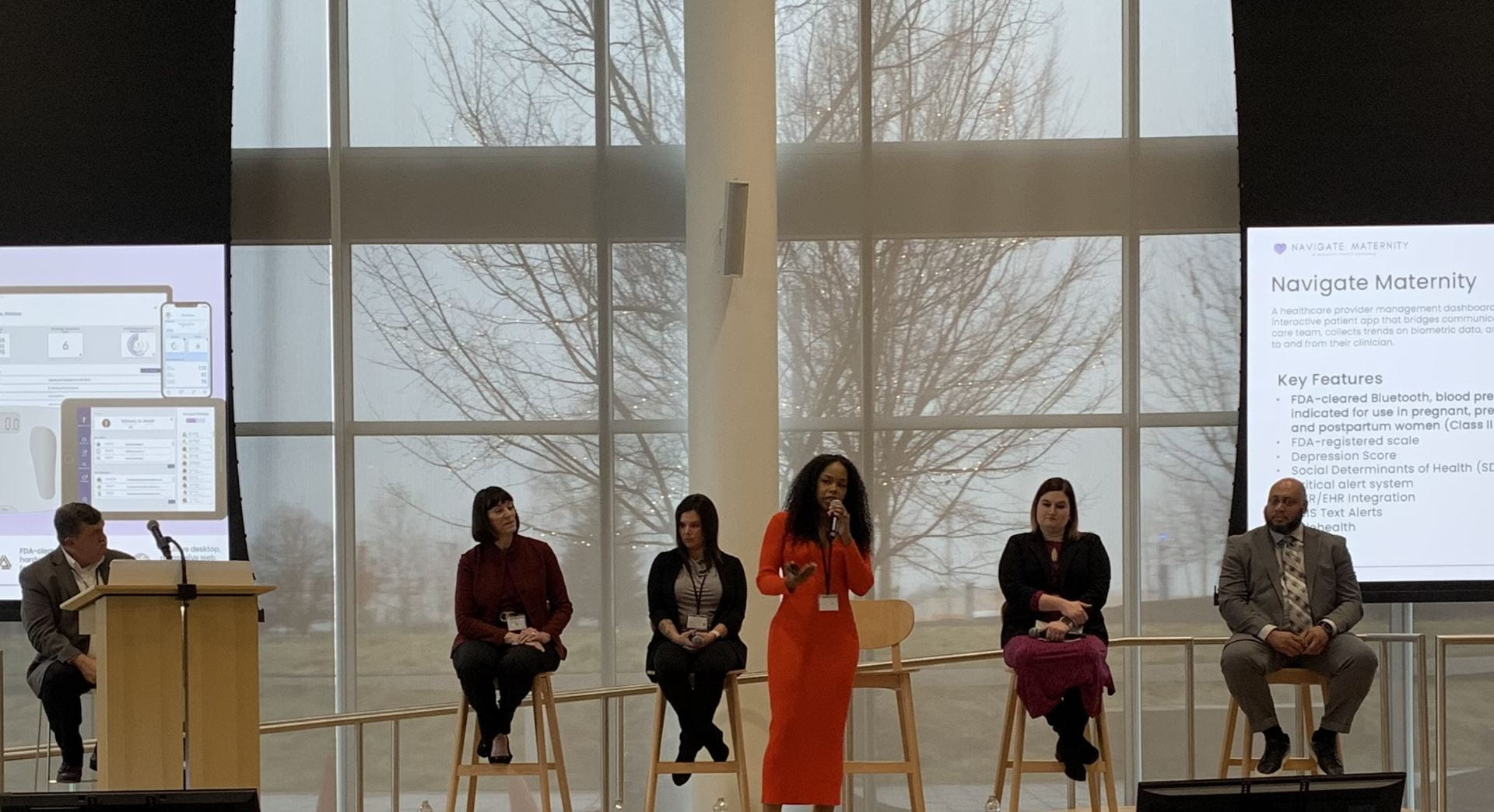
Ariana McGee of Navigate Maternity presents on their FDA device to monitor at risk pregnancies.
Ms. McGee, the subsequent speaker, elucidated the driving forces behind the establishment of her company, Navigate Maternity. She highlighted the concerning challenges faced by mothers during delivery, citing CDC data revealing a doubling of maternal deaths since 1986, with over 80% being preventable due to gaps in key clinical data resulting in inadequate maternal care. She delved into the key features of Navigate Maternity products, explaining their functionality and competitive advantages. Ms. McGee also outlined the innovative business model that underpins Navigate Maternity’s approach to addressing critical gaps in maternal care, emphasizing the company’s commitment to improving outcomes for expectant mothers.
Ms. Wood, the following speaker, detailed the healthcare equity initiatives at Purdue University. She explained how her team addresses the root causes of inequality, emphasizing that the health equity model is deeply embedded in Purdue’s policies and programs. She further elaborated on her team’s approach to improving health literacy, emphasizing being “INFORMED BY LIVED EXPERIENCES.” This involved 116 contacts with patients through 37 listening sessions. Ms. Wood showcased Purdue University’s commitment to fostering health equity by actively engaging with communities and leveraging real-life experiences to drive meaningful change.
Ms. Evans, the concluding speaker, provided an overview of the initiatives at Ground Game aimed at addressing the unmet needs of patients. She highlighted the organization’s proven Last Mile Solution at Scale, emphasizing its ability to identify and close member gaps effectively. Ms. Evans shared impactful case studies, illustrating how Ground Game’s initiatives are making a tangible difference in the lives of real people on the ground. Additionally, she presented metrics showcasing the organization’s significant outreach and quantifying the number of individuals they have successfully assisted.
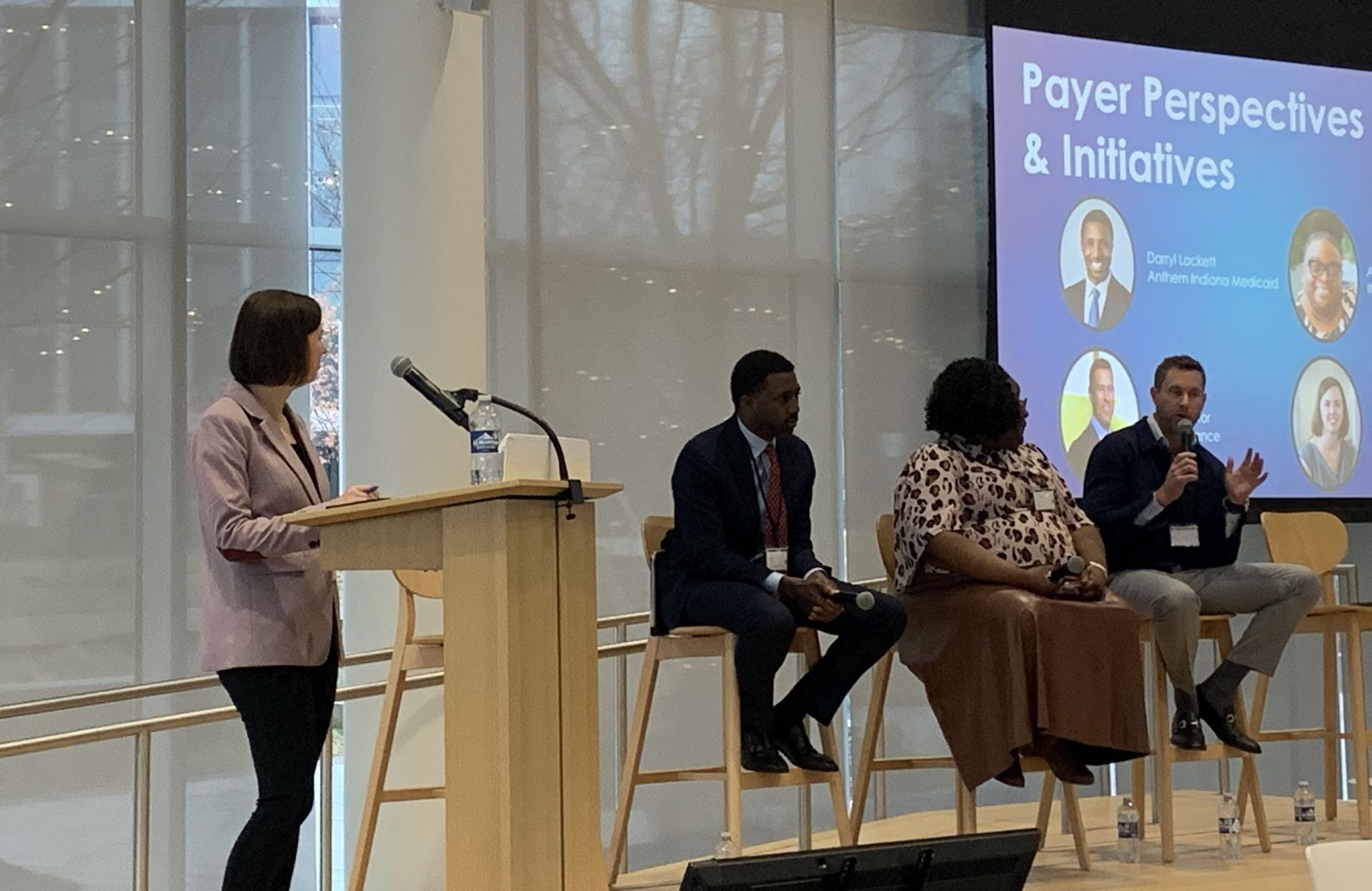
Afternoon panel discuss payer perspectives and initiatives.
Panel – Payer Perspective and Initiatives
Moderator: Jenn Kowalski, Vice President, Public Policy Institute, Elevance Health
Panel:
-Antoniette Holt, MPH, Division Director Office of Minority Health, Indiana Department of Health View Holt Presentation
-Darryl Lockett, Health Equity Director, Anthem Indiana Medicaid
-Andy Vetor, President of Benefits Consulting & Chief Growth Officer, MJ Insurance
The payer discussion was moderated by Jenn Kowalski, VP of the Public Policy Institute at Elevance Health, and featured the following members: Darryl Lockett, Health Equity Director at Anthem Indiana Medicaid; Antoinette Holt, Division Director Office of Minority Health for IU; and Andy Vetor, President of Benefits Consulting and Chief Growth Officer Insurance at MJ insurance.
Mr. Lockett initiated the discussion with a memorable story about not only saving those drowning in water, but swimming upstream to find out why the water is there in the first place. The next person to speak was Mrs. Holt with the mission to promote, protect, and improve the health and safety of all Hoosiers. Mrs. Holt challenged individuals to not only focus on health outcome disparities, like higher rates obesity, diabetes, and cancer, but to evaluate the roots of inequity, grounded in things like socioeconomic issues like poverty, discrimination, unemployment. To solve these issues, Indiana launched county initiatives like Health First to provide funding for evidence-based programs aimed at preventing negative health outcomes. Other groups, like Together We Will, have been dedicated to funding community projects that impact public health imperatives like access, COVID-19 hesitancy, environmental justice, maternal mortality, mental health, systematic barriers, substance abuse, and violence.
Mr. Vetor wrapped up the discussion speaking about MJ Insurance’s impact when it comes to promoting health equity. MJ Insurance is dedicated to helping employers optimize insurance plans for their employees and their business goals. Since most Americans are employed through their employers, Mr. Vetor believes that businesses have an important responsibility to design an optimal insurance plan that serves its employees and educates them on their health benefits. Mr. Vetor also highlighted the importance of closing gaps in healthcare, stratifying data to understanding nuances that contribute to inequality, and utilizing data to help HCPs maximize health outcomes through preventative care.
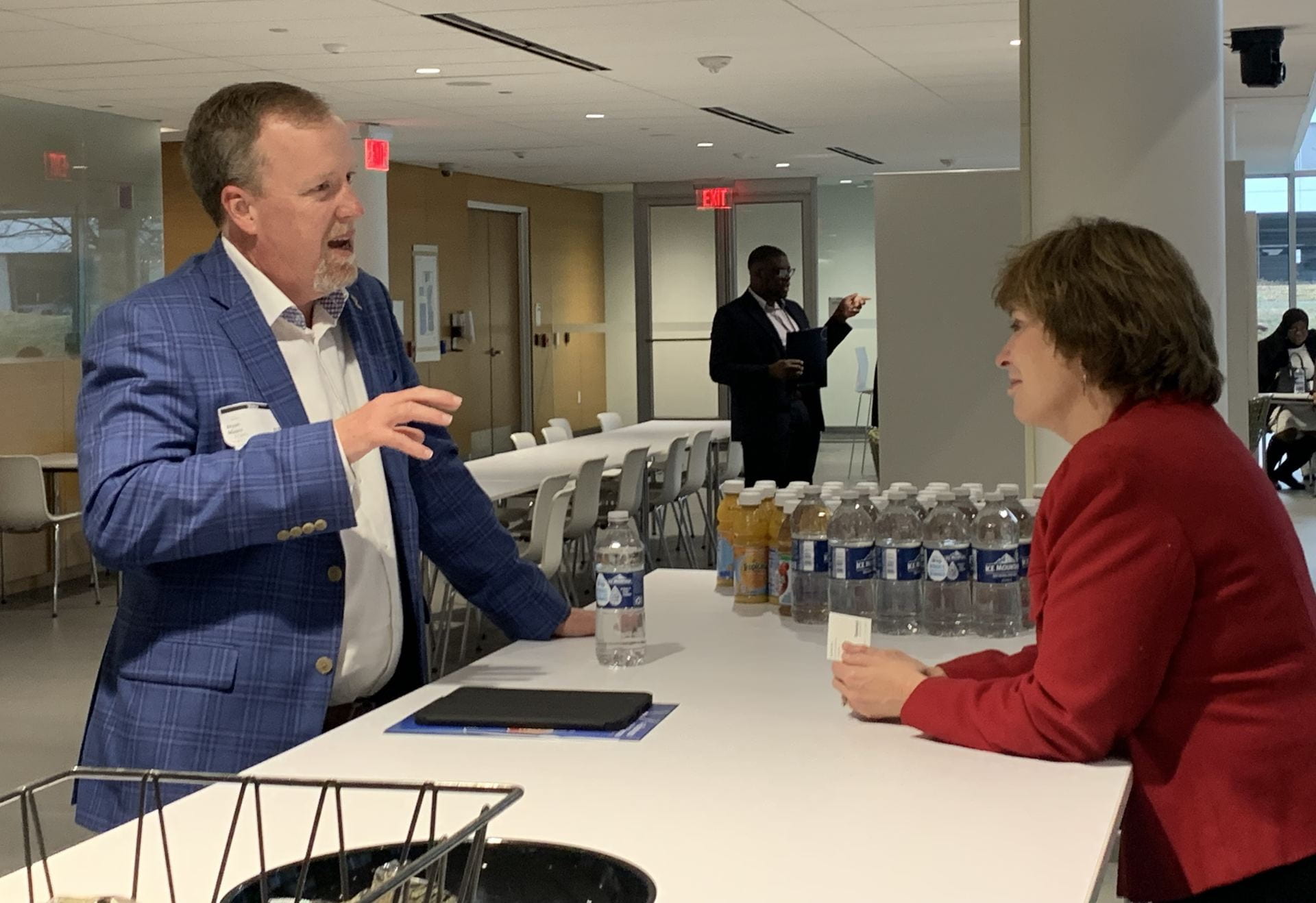
Brian Moore of Genentech and Mary Giesel of Aspire Health networking.
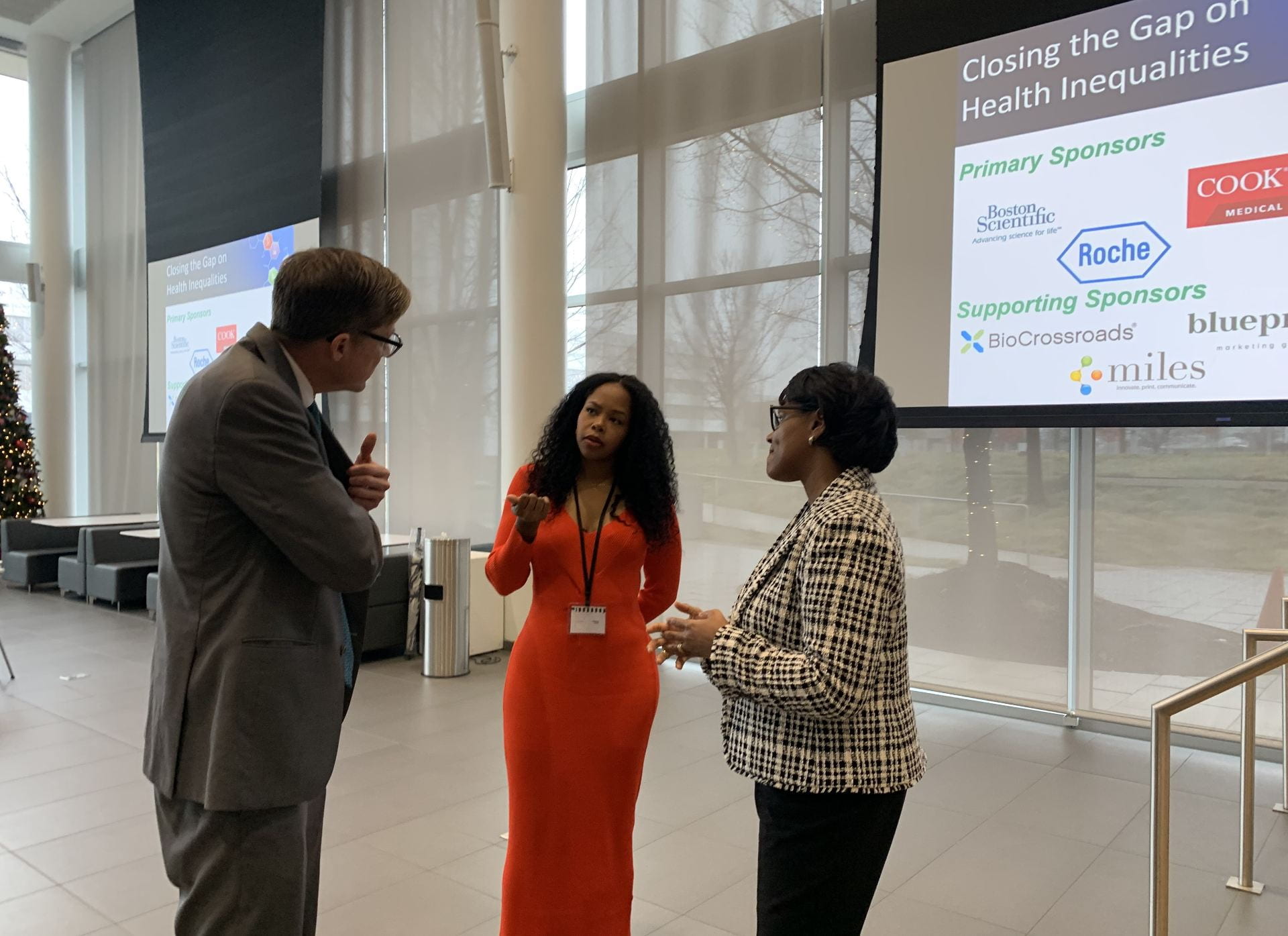
Tedd Grain of Esanazki Health & Foundation, Ariana McGee of Navigate Maternity and Dr. Brownsyne Tucker Edmonds network.
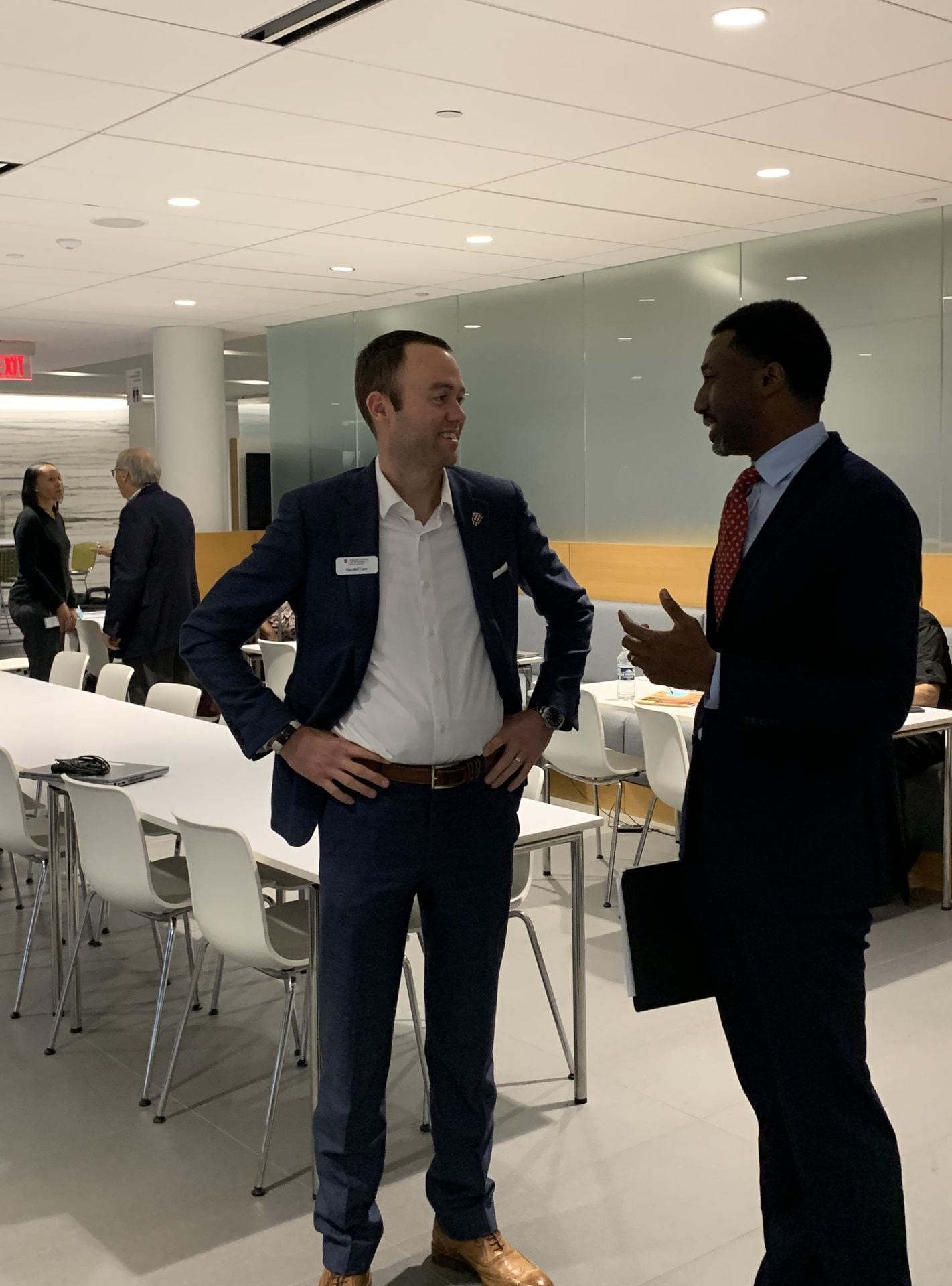
Kendall Law, Kelley MBA ’24 introduces himself to Darryl Lockett of Anthem Indiana Medicaid
Wrap-up
George Telthorst, Senior Lecturer at Indiana University and Director of the Life Sciences Academy, delivered the closing remarks, expressing gratitude to the sponsors and volunteers whose support made the event possible. He highlighted that the series would continue with more conferences, he next being on February 16 on the Impact of the Inflation Reduction Act hosted by Ice Miller LLP at OneAmerica Tower in Indianapolis. The Center for the Business of Life Sciences at the Kelley School of Business brings together students, academia life sciences companies and corporate partners to foster talent and ongoing collaboration and knowledge-sharing within the life sciences community.
Leave a Reply